Plot
The film takes place in Indonesia in the early 1940s, covering the Japanese occupation and slightly before. Hasan (Deddy Sutomo) is raised a devout Muslim and, as he grows older, falls in love with Rukmini (Christine Hakim), an equally devout woman. However, he finds himself intrigued with the modern Kartini (Emmy Salim), whom he meets through his politically active friend Rusli (Kusno Sudjarwadi). He also meets the nihilistic Anwar (Farouk Afero).
Through his interactions with Rusli and his friends, Hasan begins to doubt his Islamic faith. He becomes an atheist and marries Kartini. However, this drives him and his family further apart. When he discovers that Kartini and Anwar spent a night in a hotel together, he becomes enraged and hunts the nihilist. After killing Anwar, he himself is killed by the Kempeitai; Rusli meets a similar fate elsewhere.
Production
Atheis was directed by Sjumandjaja, who also co-produced the film with Handojo. Sjumandjaja had studied film in the Soviet Union, which may have influenced his filming techniques; a scene from Sergei Eisenstein's 1925 film Battleship Potemkin , of a baby carriage going over a flight of stone steps, was reused in Atheis. The first scene of the film shows Kartini crying over Hasan's body in a hospital; the plot then shows how this came to happen. A similar effect had been used in the novel. The film used black-and-white to show scenes from Hasan's childhood, while more modern scenes were in colour; archival footage was used to show the Japanese arriving in Indonesia.
The film was adapted from Achdiat Karta Mihardja's 1949 novel Atheis , which had proven controversial upon its release but was widely considered Mihardja's best work. [3] In an interview with Suara Karya , the director stated that he intended the film to be a challenge to Indonesia's religious communities, one which he hoped they would be willing to accept.
The cast included Deddy Sutomo, Kusno Sudjarwadi, Emmy Salim, Farouk Afero, Christine Hakim, Aedy Moward, Ernie Djohan, Maruli Sitompul, Kris Biantoro, and Rita Zahara. The Islamic novelist and scholar Hamka helped as a supervisor during filming. Production cost Rp. 80 million (US$193,771 [lower-alpha 1] ).
Release and reception
Atheis was released in 1974 to much controversy. This controversy had begun during production. In May 1974 the Indonesian censorship board had written that the film had content which was not fitting for Indonesian audiences. Sjumandjaja countered this by noting that the book had long been part of the curriculum for junior and senior high school students. The film was eventually passed, although several scenes were cut.
Although it was critically acclaimed at the time, Atheis did poorly at the box office. At the 1975 Indonesian Film Festival it won Best Adaptation from a Novel. The film critic Salim Said suggested that Sjumandjaja may have been most proud of his work on Atheis.
Writing after Sjumandjaja's death, Said found the film to be heavy-handed and noted that numerous Indonesian novels with simpler plot structures could have been used instead. Olin Monteiro, reviewing for The Jakarta Globe in 2012, wrote that the film was one of Sjumandjaja's best known and noted that the director had "focuse[d] on the characters' deepest thoughts to find the true meaning of God’s existence and the debates surrounding it", leaving audiences to decide whether or not God exists.
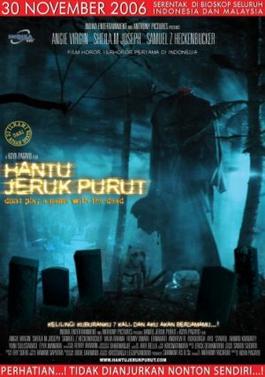
Hantu Jeruk Purut is a 2006 Indonesian horror film directed by Koya Pagayo and starring Angie Virgin, Sheila Marcia Joseph, and Samuel Z Heckenbucker. It tells the story of an aspiring writer who is haunted by the ghost she is investigating.

Achdiat Karta Mihardja was an Indonesian author, novelist and playwright. He is best known for his novel, Atheis, which was published in 1949. Atheis is considered one of Indonesia's most important literary works following World War II.

Sjumandjaja was an Indonesian director, screenwriter, and actor. During his career he wrote numerous films, directed fourteen, acted in ten, and produced nine; he also won five Citra Awards from the Indonesian Film Festival. His films reflected social realism.

Atheis is a 1949 Indonesian novel written by Achdiat Karta Mihardja and published by Balai Pustaka. The novel, using three narrative voices, details the rise and fall of Hasan, a young Muslim who is raised to be religious but winds up doubting his faith after dealings with his Marxist–Leninist childhood friend and an anarcho-nihilist writer.

Ahmad Salim, better known by his birth name Wim Umboh but also known by the Chinese name Liem Yan Yung, was an Indonesian director who is best known for his melodramatic romances.

Get Married 2 is a 2009 Indonesian romantic comedy directed by Hanung Bramantyo and starring Nirina Zubir and Nino Fernandez. A sequel to the 2007 hit Get Married, it details the efforts of Mae and Rendy to have children.
Teddy Soeriaatmadja is an Indonesian film director. Born in Japan and educated in Britain, Soeriaatmadja made his film debut in 2000 with the short film Culik (Kidnap); it was followed five years later by Banyu Biru, his feature film debut. Since then Soeriaatmadja has directed several films, including two which have garnered him a nomination for Best Director at the Indonesian Film Festival.
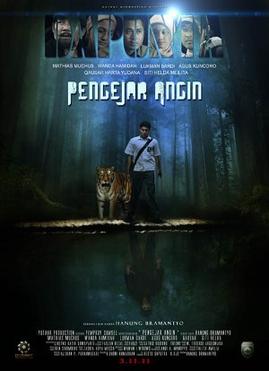
Pengejar Angin is a 2011 film by Indonesian director Hanung Bramantyo and starring Qausar Harta Yudana, Mathias Muchus, and Lukman Sardi. It tells of a young man's efforts to be able to attend university through becoming an athlete at the 2011 SEA Games. Funded in part by the government of South Sumatra, where the Games were held, the film raised criticism for its use as an advertisement.

Djadoeg Djajakusuma was an Indonesian film director and promoter of traditional art forms. Born to a nobleman and his wife in Temanggung, Central Java, Djajakusuma became interested in the arts at a young age, choosing to pursue a career in theatre. During the Japanese occupation from 1943 to 1945 he was a translator and actor, and in the four-year national revolution which followed he worked for the military's educational division, several news agencies, and in drama.
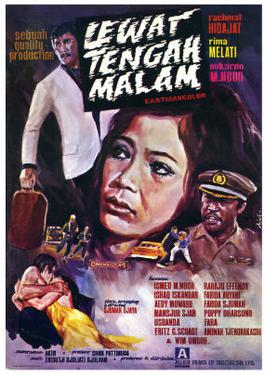
Lewat Tengah Malam is a 1971 Indonesian film and the first feature-length production by director Sjumandjaja. Starring Rachmat Hidayat, Rima Melati, and Soekarno M. Noer, it follows a thief named Lono who steals from the corrupt to give to the poor. The film, which may have been influenced by The Thomas Crown Affair (1968), was reportedly very tiring for the director, who briefly considered never directing again. The social realist elements led to Suharto's New Order government keeping Sjumandjaja under surveillance.

Budak Nafsu is a 1983 Indonesian film directed by Sjumandjaja and adapted from the 1981 novel Fatima by Titie Said. Starring Jenny Rachman and El Manik, it follows a mother who is forced to serve as a comfort woman for Japanese men stationed in British Malaya in an effort to save her daughter. The film was a commercial success, although critics have emphasised its sexual aspects.
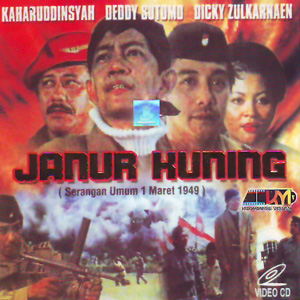
Janur Kuning is a 1980 Indonesian war film directed by Alam Surawidjaja and produced by Abbas Wiranatakusuma. Starring Kaharuddin Syah, Deddy Sutomo, and Dicky Zulkarnaen, it follows the Indonesian revolutionaries six-hour assault on Yogyakarta, under Suharto, in a show of force against the Dutch army. At the time the most expensive domestic production ever, the film's title is meant to symbolise the Indonesian people's struggle. A critical success, Janur Kuning received a nomination and two special awards at the 1980 Indonesian Film Festival. It was screened annually on 1 March between 1980 and 1998, but has since been criticised as an attempt to manipulate history and create a cult with President Suharto in the centre.

Ponirah Terpidana is a 1984 Indonesian drama film directed by Slamet Rahardjo. Starring Nani Vidia, Rahardjo, and Ray Sahetapy, it follows a young woman named Ponirah who becomes a prostitute and is arrested for the murder of a rich businessman. The film, which combined traditional and contemporary elements, was a critical success in Indonesia. It won three Citra Awards at the 1984 Indonesian Film Festival, from a total of eleven nominations.
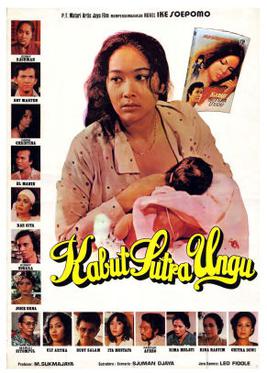
Kabut Sutra Ungu is a 1979 Indonesian film directed by Sjumandjaja and starring Jenny Rachman, Roy Marten, and El Manik. Adopted from the novel of the same name by Ike Soepomo, it follows a young widow who must overcome various obstacles before marrying again.
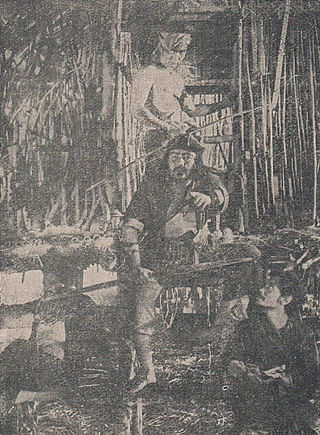
Anak Perawan di Sarang Penjamun is a 1962 Indonesian film directed and produced by Usmar Ismail for PERFINI. Starring Bambang Hermanto and Nurbani Yusuf, it follows a young woman who is kidnapped by a group of bandits, only to fall in love with their leader. The film, adapted from the 1940 novel of the same name by Sutan Takdir Alisjahbana, was repeatedly blacklisted by the Indonesian government and only saw release several years after production ended.

Mieke Wijaya was an Indonesian actress, model, and politician who won three Citra Awards. She was crowned the best female antagonist in Indonesian film industry along with Suzzanna and Ruth Pelupessy. Wijaya began her career as a teenager and soared to popularity by partaking a role in Usmar Ismail's commercially successful Tiga Dara, her name became increasingly popular after starring in the soap opera Losmen in 1987.

The Citra Award for Best Actor is an award given at the Indonesian Film Festival (FFI) to Indonesian actors for their achievements in leading roles. The Citra Awards, described by Screen International as "Indonesia's equivalent to the Oscars", are the country's most prestigious film awards and are intended to recognize achievements in films as well as to draw public interest to the film industry.
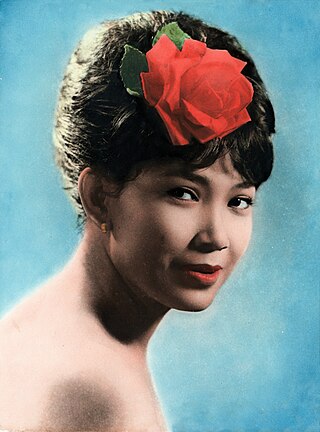
Marjolein Tambayong, better known by her stage name Rima Melati or by her nickname Lientje, was an Indonesian actress, model, and singer. She appeared in close to one hundred feature films, including works by Wim Umboh, Sjumandjaja, and Teguh Karya. She received multiple awards, including a PWI Award for Best Actress for Noda Tak Berampun, a Citra Award for Best Leading Actress for Intan Berduri, and five nominations for the Citra Award for Best Supporting Actress.

Farouk Achmad, often credited as Farouk Afero, was a British India-born Indonesian film actor. After making his feature film debut in 1964, he rose to fame in 1970 with Bernafas dalam Lumpur. Afero ultimately appeared in more than sixty films.

Laki-Laki Tak Bernama is a 1969 Indonesian film directed by Achmad Salim.


















